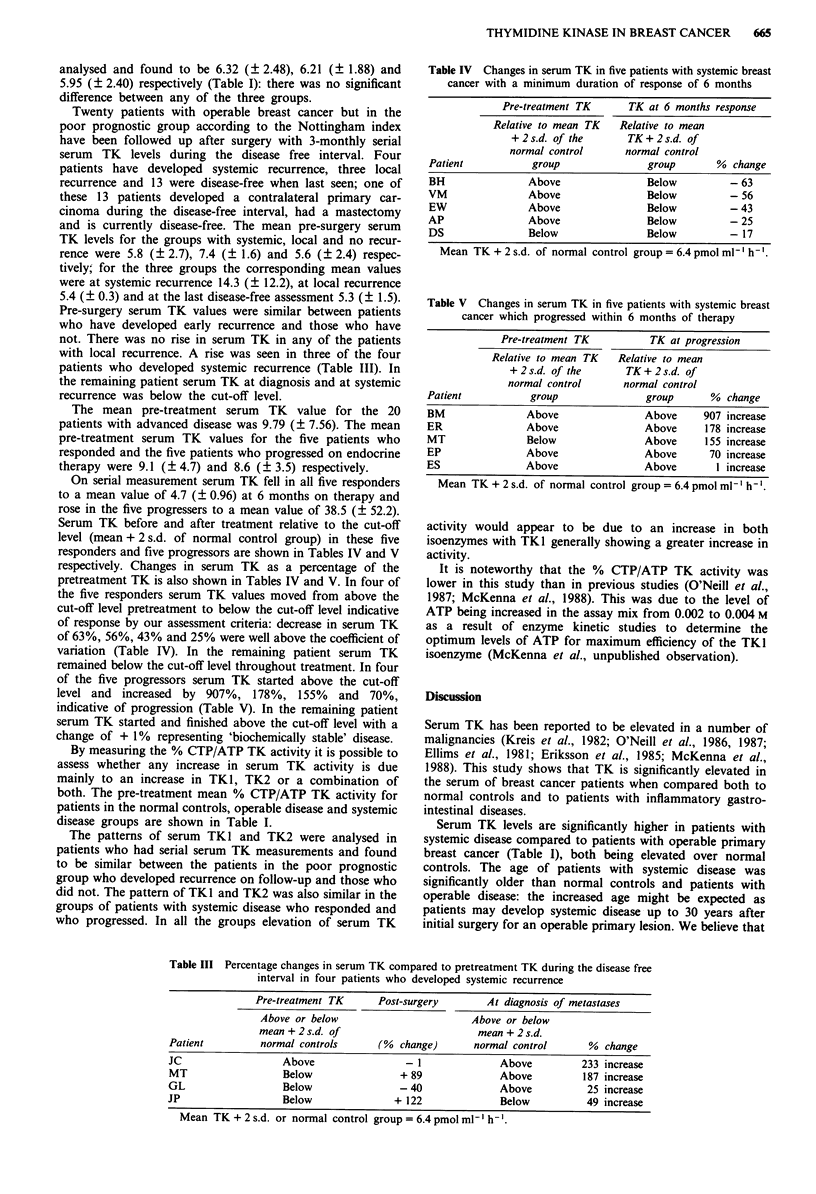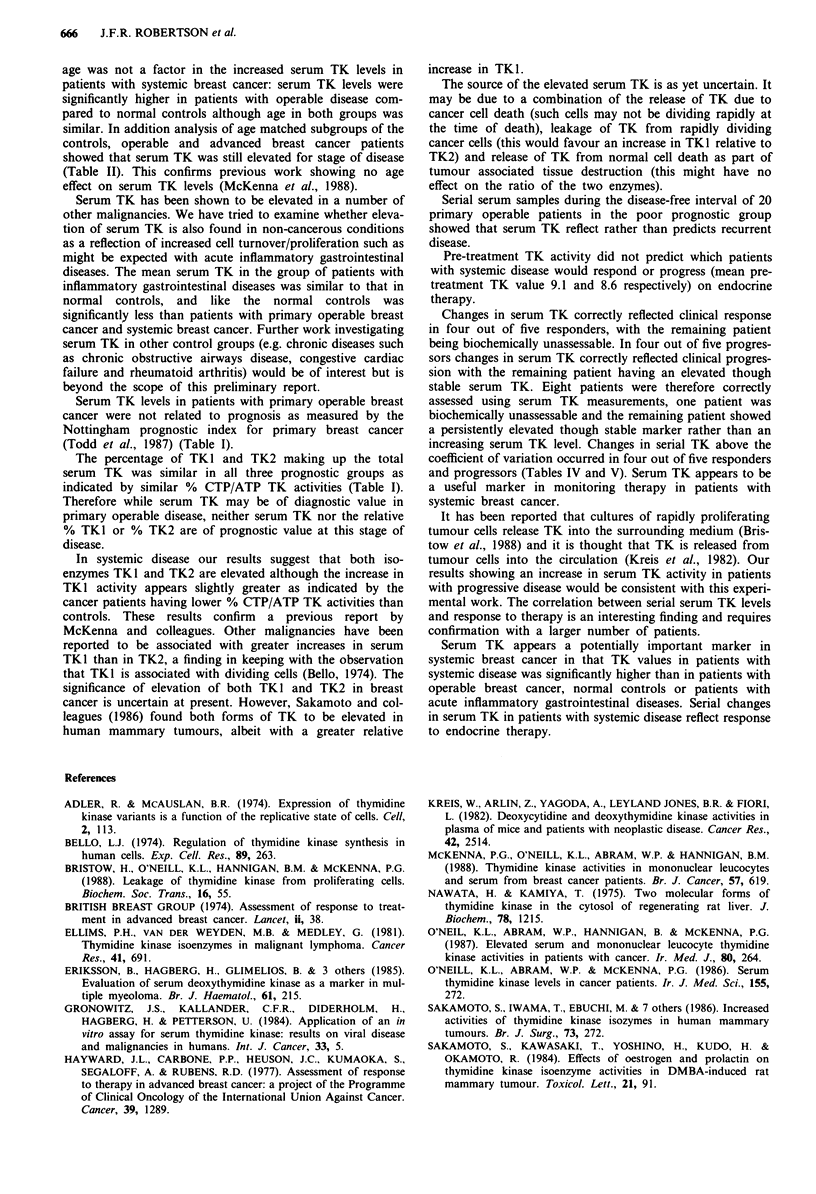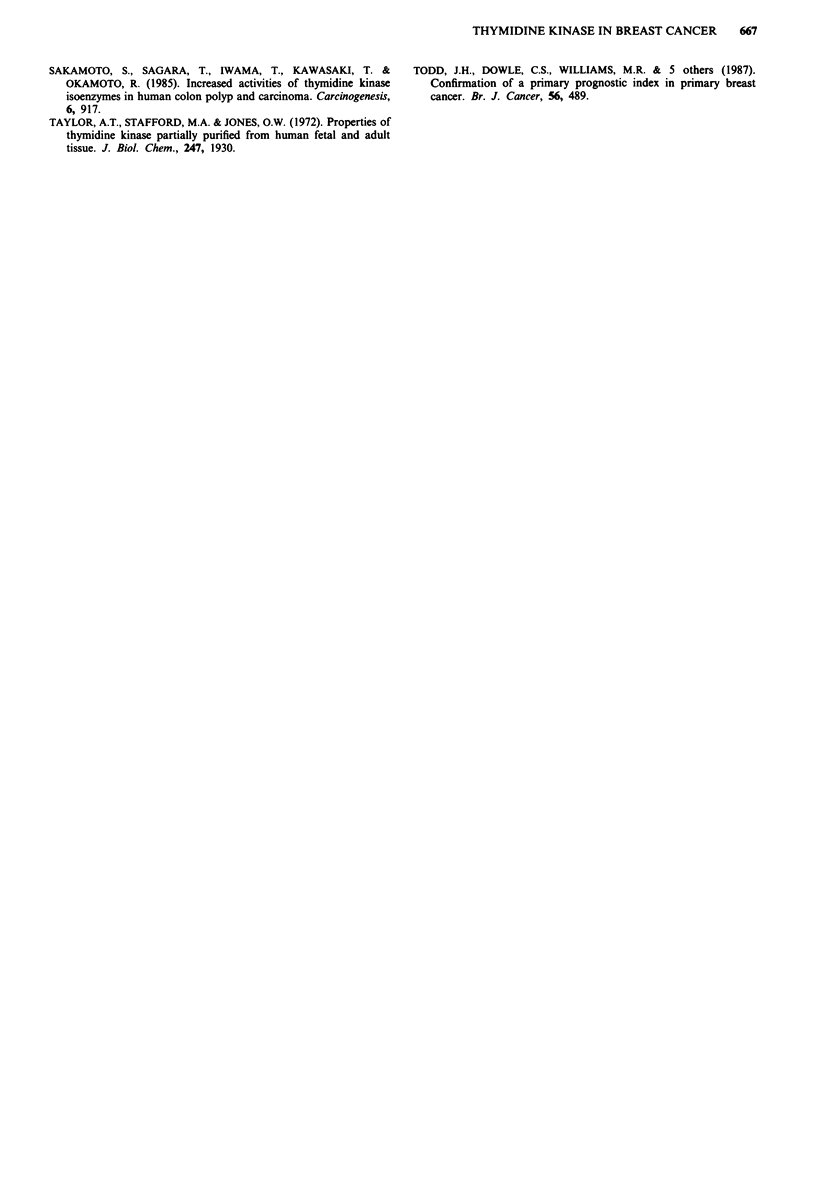Abstract
The enzyme thymidine kinase is associated with DNA synthesis. Thymidine kinase serum levels were studied in normal controls (n = 20), patients with primary breast cancer (n = 60), patients with systemic breast cancer (n = 20) and as a non-cancer disease control group in patients with inflammatory gastrointestinal disorders (n = 20). Comparison of pretreatment values in the cancer patients with the normal controls showed a significant difference between the three groups in relation to stage of disease: mean values 4.22 (+/- 1.08), 6.22 (+/- 2.24) and 9.79 (+/- 7.56) pmol ml-1 h-1 for normal controls, operable breast cancer and systemic breast cancer respectively (P less than 0.005; analysis of variance). Patients with systemic breast cancer had a significantly elevated serum thymidine kinase level compared to controls (P less than 0.01) and patients with primary operable cancer (P less than 0.05). Patients with primary operable cancer had significantly higher serum thymidine kinase levels over normal controls (P less than 0.01). Mean serum TK in patients with inflammatory gastrointestinal diseases was similar to normal controls but significantly less than both patients with primary operable breast cancer and patients with systemic breast cancer. Twenty patients with operable breast cancer were followed up after primary surgery by serial 3-monthly thymidine kinase levels in the disease free interval. Four patients have developed systemic recurrence with a rise in the mean thymidine kinase value to 14.3 pmol ml-1 h-1. Ten patients with advanced breast cancer had serial thymidine kinase levels measured 2-monthly during the first 6 months of primary hormone therapy. The serum values fell in all five responders (mean 9.12-4.78 pmol ml-1 h-1) and rose in all five progressors (mean 8.62-38.5 pmol ml-1 h-1). Serum thymidine kinase reflects stage of disease in breast cancer. Serial thymidine kinase levels in patients with systemic breast cancer reflected response to systemic therapy.
Full text
PDF




Selected References
These references are in PubMed. This may not be the complete list of references from this article.
- Adler R., McAuslan B. R. Expression of thymidine kinase variants is a function of the replicative state of cells. Cell. 1974 Jun;2(2):113–117. doi: 10.1016/0092-8674(74)90100-7. [DOI] [PubMed] [Google Scholar]
- Bello L. J. Regulation of thymidine kinase synthesis in human cells. Exp Cell Res. 1974 Dec;89(2):263–274. doi: 10.1016/0014-4827(74)90790-3. [DOI] [PubMed] [Google Scholar]
- Ellims P. H., Van der Weyden M. B., Medley G. Thymidine kinase isoenzymes in human malignant lymphoma. Cancer Res. 1981 Feb;41(2):691–695. [PubMed] [Google Scholar]
- Gronowitz J. S., Källander F. R., Diderholm H., Hagberg H., Pettersson U. Application of an in vitro assay for serum thymidine kinase: results on viral disease and malignancies in humans. Int J Cancer. 1984 Jan 15;33(1):5–12. doi: 10.1002/ijc.2910330103. [DOI] [PubMed] [Google Scholar]
- Hayward J. L., Carbone P. P., Heuson J. C., Kumaoka S., Segaloff A., Rubens R. D. Assessment of response to therapy in advanced breast cancer: a project of the Programme on Clinical Oncology of the International Union Against Cancer, Geneva, Switzerland. Cancer. 1977 Mar;39(3):1289–1294. doi: 10.1002/1097-0142(197703)39:3<1289::aid-cncr2820390340>3.0.co;2-f. [DOI] [PubMed] [Google Scholar]
- Kreis W., Arlin Z., Yagoda A., Leyland-Jones B. R., Fiori L. Deoxycytidine and deoxythymidine kinase activities in plasma of mice and patients with neoplastic disease. Cancer Res. 1982 Jun;42(6):2514–2517. [PubMed] [Google Scholar]
- McKenna P. G., O'Neill K. L., Abram W. P., Hannigan B. M. Thymidine kinase activities in mononuclear leukocytes and serum from breast cancer patients. Br J Cancer. 1988 Jun;57(6):619–622. doi: 10.1038/bjc.1988.141. [DOI] [PMC free article] [PubMed] [Google Scholar]
- Nawata H., Kamiya T. Two molecular forms of thymidine kinase in the cytosol of regenerating rat liver. J Biochem. 1975 Dec;78(6):1215–1224. doi: 10.1093/oxfordjournals.jbchem.a131019. [DOI] [PubMed] [Google Scholar]
- O'Neill K. L., Abram W. P., McKenna P. G. Serum thymidine kinase levels in cancer patients. Ir J Med Sci. 1986 Aug;155(8):272–274. doi: 10.1007/BF02939884. [DOI] [PubMed] [Google Scholar]
- O'Neill K., Abram P., Hannigan B., McKenna G. Elevated serum and mononuclear leukocyte thymidine kinase activities in patients with cancer. Ir Med J. 1987 Sep;80(9):264–265. [PubMed] [Google Scholar]
- Sakamoto S., Iwama T., Ebuchi M., Tsukada K., Sagara T., Kawasaki T., Murakami S., Kasahara N., Kudo H., Okamoto R. Increased activities of thymidine kinase isozymes in human mammary tumours. Br J Surg. 1986 Apr;73(4):272–273. doi: 10.1002/bjs.1800730409. [DOI] [PubMed] [Google Scholar]
- Sakamoto S., Kawasaki T., Yoshino H., Kudo H., Okamoto R. Effects of estrogen and prolactin on thymidine kinase isozyme activities in DMBA-induced rat mammary tumor. Toxicol Lett. 1984 Apr;21(1):91–96. doi: 10.1016/0378-4274(84)90228-5. [DOI] [PubMed] [Google Scholar]
- Sakamoto S., Sagara T., Iwama T., Kawasaki T., Okamoto R. Increased activities of thymidine kinase isozymes in human colon polyp and carcinoma. Carcinogenesis. 1985 Jun;6(6):917–919. doi: 10.1093/carcin/6.6.917. [DOI] [PubMed] [Google Scholar]
- Taylor A. T., Stafford M. A., Jones O. W. Properties of thymidine kinase partially purified from human fetal and adult tissue. J Biol Chem. 1972 Mar 25;247(6):1930–1935. [PubMed] [Google Scholar]
- Todd J. H., Dowle C., Williams M. R., Elston C. W., Ellis I. O., Hinton C. P., Blamey R. W., Haybittle J. L. Confirmation of a prognostic index in primary breast cancer. Br J Cancer. 1987 Oct;56(4):489–492. doi: 10.1038/bjc.1987.230. [DOI] [PMC free article] [PubMed] [Google Scholar]


